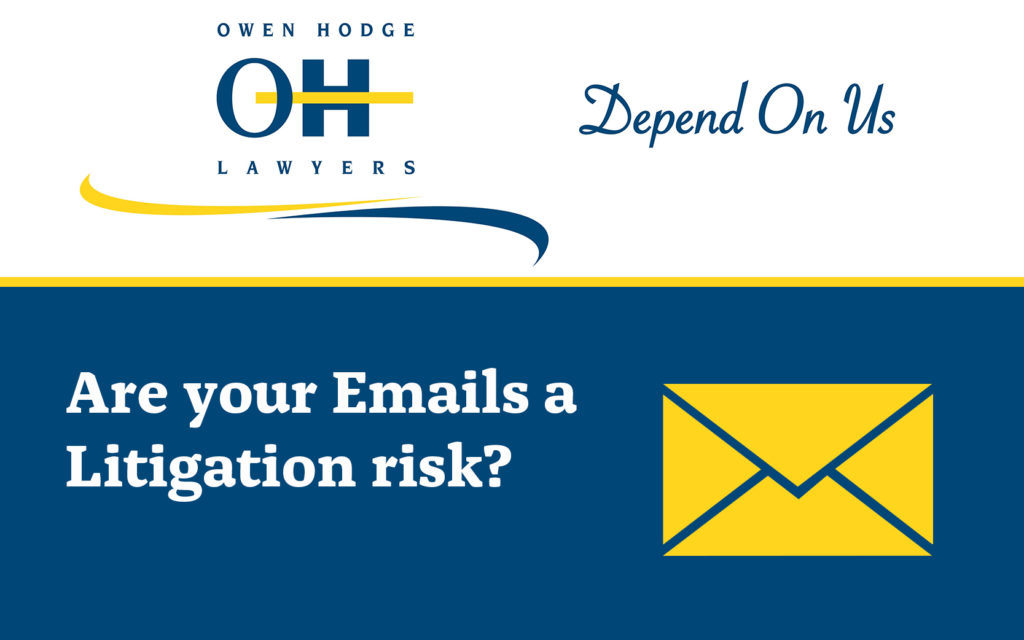
This post looks at some of the ways email and common email practices in business can expose companies to risk of litigation, litigation costs, or risk greater damages as a result of litigation. This post also offers tips to overcome each of the risks described.
Emails are used to converse within a corporate environment more so than any other form of communication. It is very easy to slip into a more colloquial tone of voice when communicating with colleagues via email, however this can turn into a detriment should these relationships sour.
In court cases, it is not uncommon for a single document to be the final deciding factor. The document doesn’t even need to be an express confession of wrongdoing, it can be something as simple as an exaggerated statement from marketing, or even a private joke between colleagues. These types of otherwise harmless communications can be manipulated and distorted by the opposing counsel to sway a high-stakes lawsuit.
It is too late to delete incriminating emails once the litigation process has begun. It is important to make sure that your emails pose zero risk to your job or to your organisation. Many employers will monitor the emails of their employees, and it is not uncommon for people to be fired for violating their company’s email policy.
Think before you hit send
The number one rule when it comes to proper email conduct is to always ensure that you are extra careful with your communication. This applies not only to informal emails between colleagues, but can also apply to a terse or firmly worded email.
While the temptation to fire off a rapid response to an email that has made you angry or upset, sometimes temper can get the best of us. It is always better to take a moment to gather your thoughts prior to responding. Once an email is sent, it is next to impossible to get it back.
It is important to be careful at all times to keep communication professional. Never convey anger, use profanity, make racist or sexist remarks, or use language that can be considered obscene.
![]()
Reply vs Reply All
The leading cause of embarrassment and confusion with emails is the mistake of accidentally hitting reply all when you simply meant to hit reply. This can then range from something as groundbreaking as private/confidential information being sent to all, or an awkward sassy reply.
In any case, it is important to know if you are responding to an individual, or a group (that may or may not include your boss!) so always make sure to carefully pay attention before you hit send.
Any and all corporate communication can become evidence
It is crucial to keep in mind that anything that is communicated in any context can be used as evidence by the company. To be classified as communication, and therefore admissible as evidence, the communication can be anything from an email, text message, instant message, voicemail or even a Post-It note.
Companies that have previously been involved in lawsuits are sometimes required to provide hundreds of thousands of pages of both electronic and hardcopy documents. This means that every communication, no matter how unofficial or trivial, needs to be written with care and attention to detail, context and language.
Privacy
Corporate employees should be aware of the fact that with respect to workplace communication, there is no such thing as “private” emails. An email between two friendly co-workers discussing anything confidential could one day be used in a lawsuit.
While employers do need to give notice to employees 14 days prior to monitoring email as per the Workplace Surveillance Act, this can be included in an employee’s contract at the outset. Employers must also have an up-to-date email and internet policy, where it is made clear that the emails and computers in the workplace belong to the employer.
Get the help from us
At Owen Hodge Lawyers, we are always happy to work with employers to ensure that your workplace is protected from any rapidly developing online security risks, including how to ensure against any emails becoming a litigation risk.
In the event that you find yourself in need of assistance with work-related communication issues, please don’t hesitate to contact the offices of Owen Hodge Lawyers. At Owen Hodge, we are always happy to assist clients in understanding the full consequences of any legal issues. Please feel free to call us at your earliest convenience to schedule a consultation on 1800 770 780.
